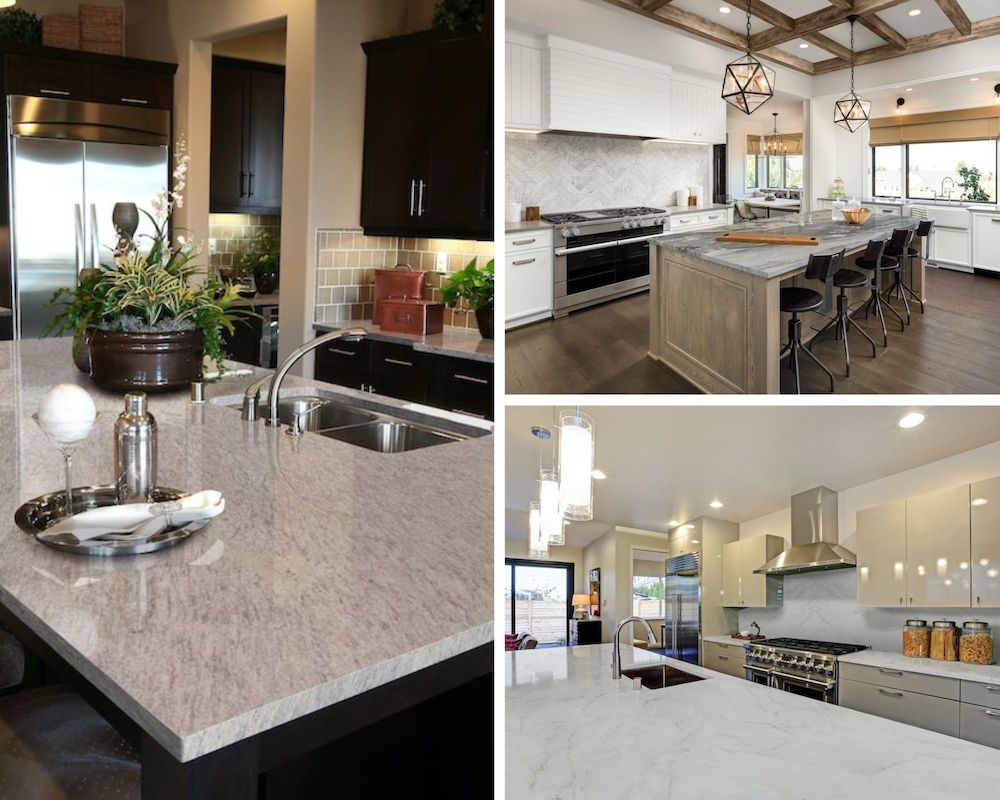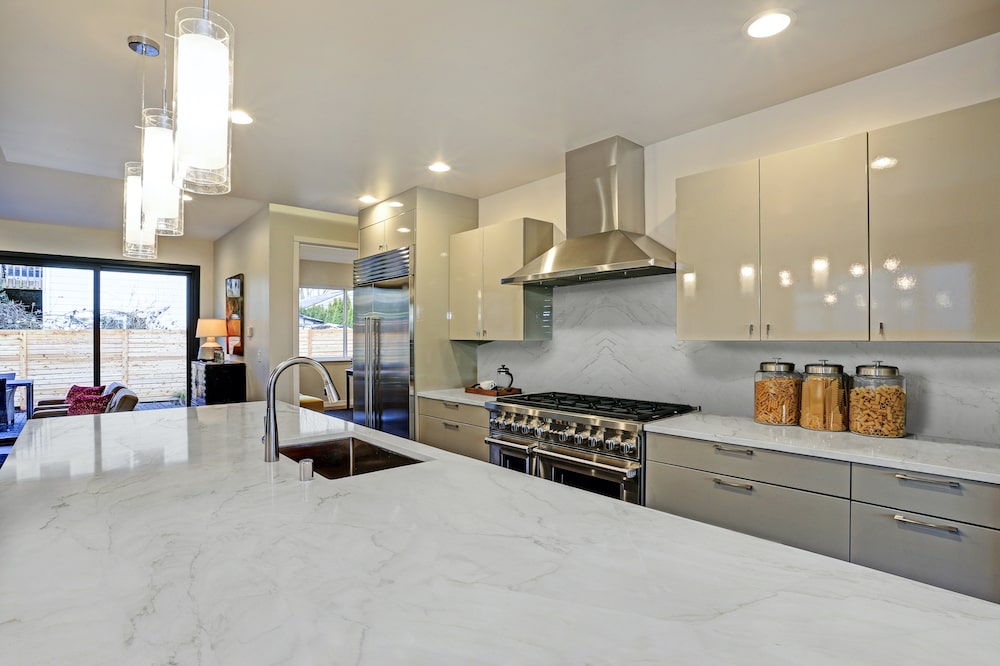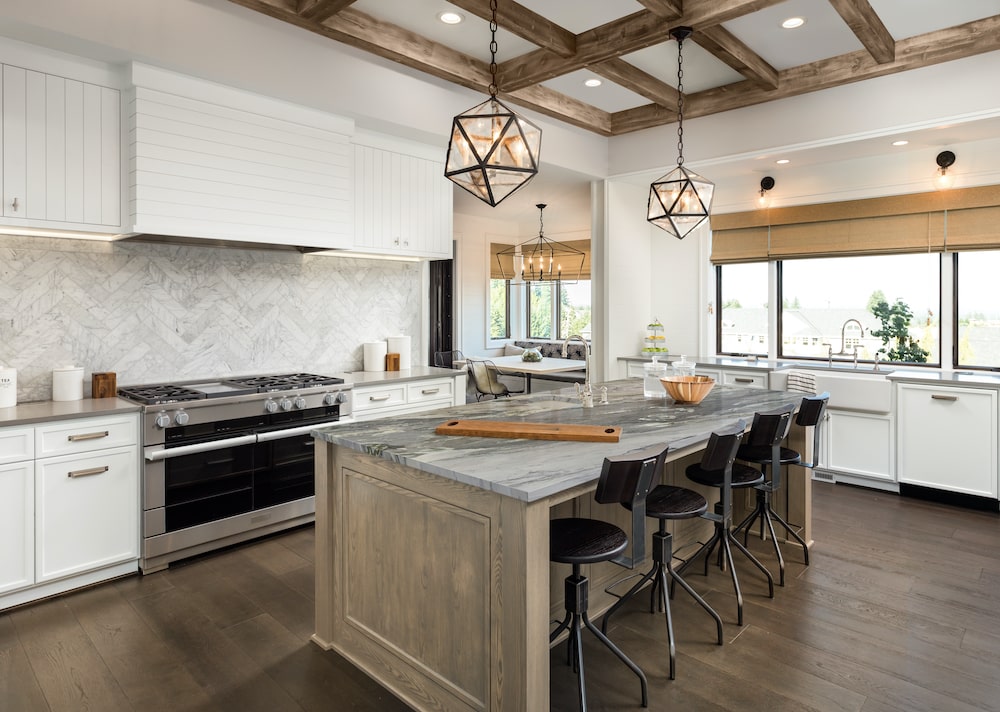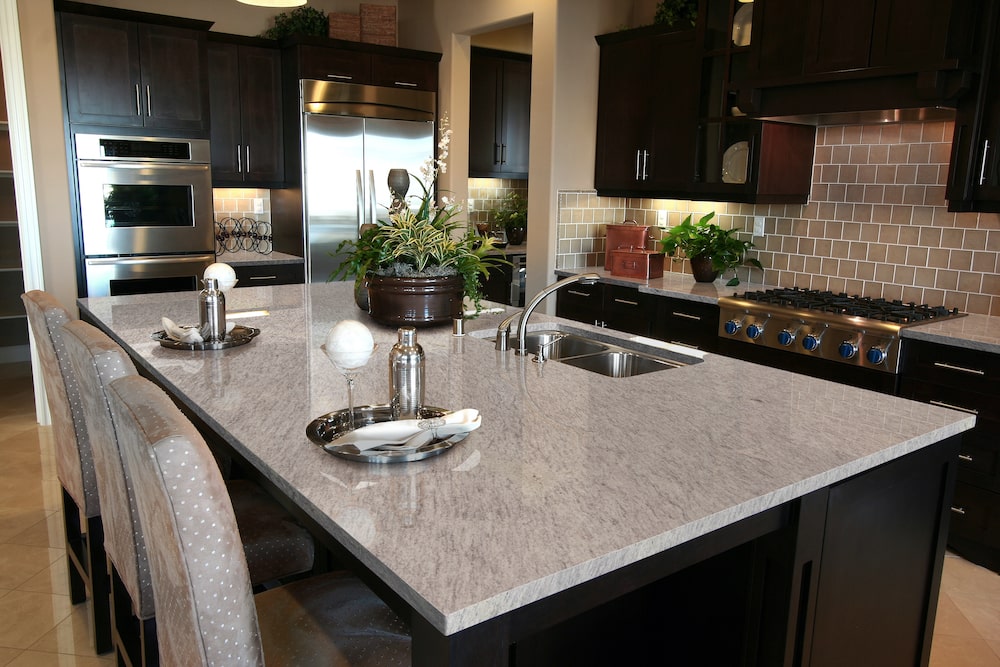Our Most Popular Natural Stone Countertop Choices: Marble, Quartzite, And Granite
October 24, 2021
For many homeowners, granite countertops are synonymous with upscale elegance in kitchen design. We couldn’t agree more, but it’s not the only natural stone that can elevate a kitchen or bathroom’s style and beauty. Quartzite and marble are also popular choices.
So, how do you decide which natural stone is right for your home improvement project? This blog article discusses the benefits of each so you’ll never have a fear of missing out.
Quartzite
All types of natural stone countertop slabs are quarried from the earth, but they have different compositions. Quartzite is a metamorphic rock that began as sandstone. When exposed to tremendous pressure and heat, the individual sand grains in sandstone fuse together to create a dense rock consisting almost entirely of quartz. Because natural sand is typically pale beige, gray, or white, those are the colors normally found in quartzite. Different shades such as blue, green, or pink may occur when other minerals are present as well.
Quartz is 7 on a Mohs scale, which is the measure of a mineral’s hardness. This makes quartzite the hardest natural stone countertop available, harder than granite, and much harder than marble. It’s heat-resistant, so it’s unlikely to be damaged by hot pots and pans. It does not etch when exposed to acidic liquids. Some types of quartzite are more porous than others, but like any natural stone countertop, we recommend applying a sealer regularly to keep it water-resistant.
Aside from quartzite’s impressive durability and resistance to stains and scratches, homeowners appreciate the unique look of quartzite countertops. It’s available in a wide range of hues and patterns, from subtle patterns to dramatic options such as Audacia. The countertop and backsplash in this kitchen feature bold linear veins not typically found in other types of natural stone slab. Try out our countertop visualizer tool to see how it will look alongside various types of flooring and cabinetry.
Marble
Marble has been used for millennia for building construction, sculpture, flooring, and other purposes. Like quartzite, marble is a metamorphic stone, but it originated as limestone instead of sandstone. It is primarily made of calcium carbonate, and the purest marble is sparkling white. You can see tiny calcite crystals within the stone. Also similar to quartzite, varying colors and veining found in marble result from mineral impurities.
Because it is a softer type of stone, marble might not seem to be the best choice for a kitchen or bathroom countertop. However, this gives it the advantage of being easier to cut and carve. So, it’s more compatible with fancy countertop edges and other types of shaping. Another advantage of marble countertops is heat resistance, but it’s marble’s ability to stay cool that makes it a favorite surface for chefs — it’s ideal for rolling out pastry, which needs to stay at a constant temperature to turn out perfectly.
The look of marble countertops is the biggest selling point for many homeowners and kitchen designers, though. Whether it’s polished to a high gloss or given a more natural matte texture, marble has an ethereal translucent quality that is hard to reproduce in other countertop materials, although engineered quartz comes close. Whether it’s a classic white with subtle gray veining or a more exotic combination of colors such as MSI’s Fantasy Black marble, its style is timeless and versatile.
Granite
Granite is formed differently than the other two natural stones in this article. It is an igneous rock, which means that it’s created when molten lava or magma cools, deep inside the earth, under high pressure. It’s a combination of several different minerals, occurring in varying proportions. The three main components of granite are feldspar, quartz, and mica, and the inclusion of other minerals provides a wide variety of granite colors.
Although quartzite is slightly harder on the Mohs scale, granite is an extremely tough, durable stone. Despite this hardness, it’s easily customized with edge treatments and different surface textures, such as polished, honed, or brushed. It’s water- and stain-resistant but still needs to be sealed about once a year to stay looking its best. It’s hard to scratch, so it can stand up to decades of heavy use by an active family. And, if your granite countertop should scratch or chip, a countertop restoration professional will probably be able to repair it or make the damage less visible.
One of the biggest advantages of granite kitchen countertops is the huge variety available. As with all natural stone countertops, homeowners are encouraged to visit the slab yard or showroom and pick out the exact slab they want to install in their kitchens or bathrooms. This is especially important when you fall in love with bold granite colors like MSI’s Antico Silver Granite. Our Slab Inventory Search Tool can help you locate your selected color of granite countertop, as well as other natural stone slabs.
What about the cost? While pricing shouldn’t be the only consideration in your decision about your new countertop, most homeowners have a budget to keep in mind. The granite countertop cost is typically the least of these premium surfaces, and marble and quartzite are similar in price per square foot. However, keep in mind that with all natural stone types, there will be a wide variation depending on several factors, including exotic colors and patterns vs. more common ones, edge and surface treatments, thickness, and quality.
Your final choice of natural stone for your home countertops comes down to personal choice, as no stone type is better than another in all respects. You’ll need to consider your favorite looks, decorating style, lifestyle, and the amount of work you’re willing to put into protecting and maintaining your investment. No matter which you choose, your new natural stone countertop will provide a lifetime of beauty.
Which is best for your project? Let's talk! Chat with us online now, visit one of our many MSI showrooms nationwide, or find your nearest authorized MSI retailer and get guidance from a helpful MSI agent.
READ MORE ABOUT GRANITE COUNTERTOPS
Granite Vs. Quartz Vs. Quartzite — How to Choose the Right Countertop
Choose the Perfect Granite Countertop with MSI's Slab Selection Process
8 Unique and Exotic Granite Countertop Colors From MSI
7 White Granite Countertops for A Modern Look
 Calacatta Montreal Quartzite
Calacatta Montreal Quartzite Portinari Marble
Portinari Marble Arctic Valley Granite
Arctic Valley Granite